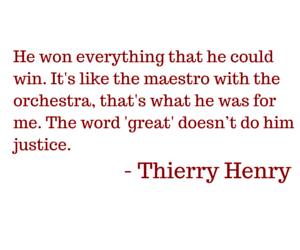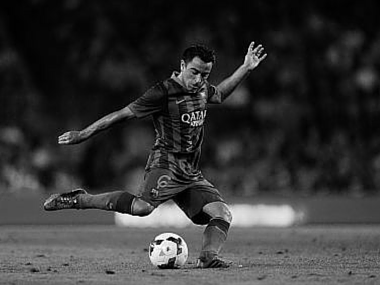“In football, the result is an impostor. You can do things really, really well but not win. There’s something greater than the result, more lasting — a legacy.” - Xavi Xavi Hernandez has openly wept a few times recently. First, after the Copa del Rey final, and then, during a farewell organised by Barcelona. It was hard to watch a player who was unbreakable on the pitch break down but not surprising under the weight of his magnificent career: 17 seasons, 25 trophies, most number of appearances for Barcelona, most number of appearances by a player in European club competition, eight La Liga titles, four Champions League titles, three Copas, one World Cup, two European Championships and numerous personal honours including thrice coming third in Ballon d’Or race and Euro 2008 Player of the Tournament. [caption id=“attachment_2283122” align=“alignleft” width=“380”]  Xavi leaves behind a remarkable legacy. Getty Images[/caption] Since Opta started keeping detailed player stats in 2006, Xavi has made 17,547 passes at the Nou Camp, of which he completed 93.3 percent. He has 96 goals and 187 assists in all competitions. He has never been given a straight red card. But this is not just about titles and results. This is about Xavi’s legacy. This is about how he made the beautiful game even more beautiful. This is about what he leaves behind — his obsession with playing football the right way in an age where image rights and farcical egos and rigid tactics and broadcast money count for more than the simple act of playing the ball. Xavi convinced one that to be good, you didn’t need step-overs and tricks and flicks. You could play simple pass-and-move football - the game broken down to its most basic – and still be lethal. Xavi convinced you that a 60-yard through ball fizzing through a gap between four defenders was as devastating as a thumping volley, and more importantly, as enjoyable.  With his obsession, Xavi convinced his managers to play the right way. The argument that Xavi fits into a particular system is flawed. Spain and Barcelona could only play tiki-taka only because they had Xavi. That’s why Pep Guardiola has not managed to do the same at Bayern Munich. After coaches realised they could use the man’s unbelievable talent to play an incredibly tough system, their teams started winning. Before Xavi got started, Spain were cursed outsiders who never entered the elite nations’ category despite their talent. Barcelona had won one Champions League title. Today, both teams can boast of dominating the game like no other in the history of the sport. And at the heart of those teams was Xavi. Always there, always available, always looking, thinking, acting — and passing, passing, passing — until teams got tired of him. Until all his markers could mark was his shadow and all defenders could tackle was air as he turned on the ball and released it before they could think. Oh and the way he received the ball — always on the opposite foot from which side the ball was travelling so that he didn’t have to move past a man. An impeccable technique born out of a desire to control; his face a constant expression of making things look easier when we can all see it’s not. His incessant buzzing around the centre circle – like a fly who just cannot be swatted. As a Barca Blaugranes tribute says: wrestling a tiger was an easier task than dispossessing Barça’s number six. “Quick passes, using the space, triangles, double passes, depth, pausing, rhythm, I pass and I move, I help you, I look for you, I stop, I raise my head, I look and, above all, I open up the pitch. " – Xavi He was the most vibrant coat of paint that made both Barcelona and Spain masterpieces in the art of football. Yet, he preferred to stay out of the spotlight, always allowing space for others to bask in it. His play was defined by a constant desire to provide the best for his teammates. His only vanity was hair gel. But it was not just about passing. It was about forward passing and winning the ball back through the ‘6-second rule’. It’s no surprise therefore that with Xavi’s physical decline, Spain and Barcelona struggled. Spain were crushed in World Cup 2014 and Barcelona failed to win a trophy in 2014. New manager Luis Enriques may have won the treble this season but he plays in a more dynamic and impatient way, helped by the addition of Luis Suarez. In this system though, Xavi has succeeded too. In just 31 league appearances this season, Xavi still records the highest pass completion rate (93 percent), has made 43 key passes (only behind Lionel Mess and Neymar) and has created eight goals (only behind Messi). But he is no longer integral. Messi, Neymar and Suarez have formed a fearsome attacking trident and have Ivan Rakitic, Sergio Busquets and Andres Iniesta to back them up. For a player who controlled games like no other, this is a hard pill to swallow.  Xavi is too used to being the binder of the team – the creator in chief – the provider – the controller of the carousel. Three of the six goals Spain scored in their two European Championship finals and the World Cup final were provided by Xavi. Against Italy in the Euro 2012 final, he completely overshadowed the Azzuri playmaker Andrea Pirlo – making 95 passes to the Italian’s 57. He has won countless Clasicos. But this Barcelona team can do it without him — which is why it’s time to go. It’s a hard day for football fans around the world. Xavi redefined midfield play. His performance against PSG in the Champions League in 2013, when he got 96 out of 96 passes right is just one example of the kind of genius he is. It’s hard to see another player like that emerge in modern football. Xavi didn’t have the flamboyance (or madness) of Zinedine Zidane, hasn’t scored as many goals as Frank Lampard and didn’t take freekicks like Pirlo; he was not tireless like Steven Gerrard and Clarence Seedorf. He’s no roving, dribbling, driving midfielder in the mould of Iniesta nor did he have the tackle of Claude Makalele. What Xavi provided was so easy on the eye we hardly noticed. It doesn’t even matter here that Xavi has more accolades and better stats than all those players — even though he played in a more withdrawn position than most of those names. What matters here is his legacy, among the best of all time. A legacy which means you mention his name in the same breath as a superlative tactic — a legacy under which great forwards flourished and underachieving teams became world-beaters — a legacy which put the fury in La Roja and reminded us of the essence of Barcelona. A legacy which put to bed the ridiculous argument that small midfielders can’t make it, motivating millions of less built kids to take up the sport. Xavi Hernandez can leave Barcelona with pride. He can leave knowing that not only did he dupe the impostor of football that is ‘results’. He also left behind an undying legacy, one left behind by the greatest midfielder in modern football. 
Xavi was always there, always available, always looking, thinking, acting — and passing, passing, passing — until teams got tired of him.
Advertisement
End of Article
Written by Pulasta Dhar
If there is one place Pulasta Dhar wanted to live, it would be next to the microphone. He writes about, plays and breathes football. With stints at BBC, Hallam FM, iSport, Radio Mirchi, The Post and having seen the World Cup in South Africa, the Manchester United fan and coffee addict is a Mass Media graduate and has completed his MA in Broadcast Journalism from the University of Sheffield." see more


)

)
)
)
)
)
)
)
)



